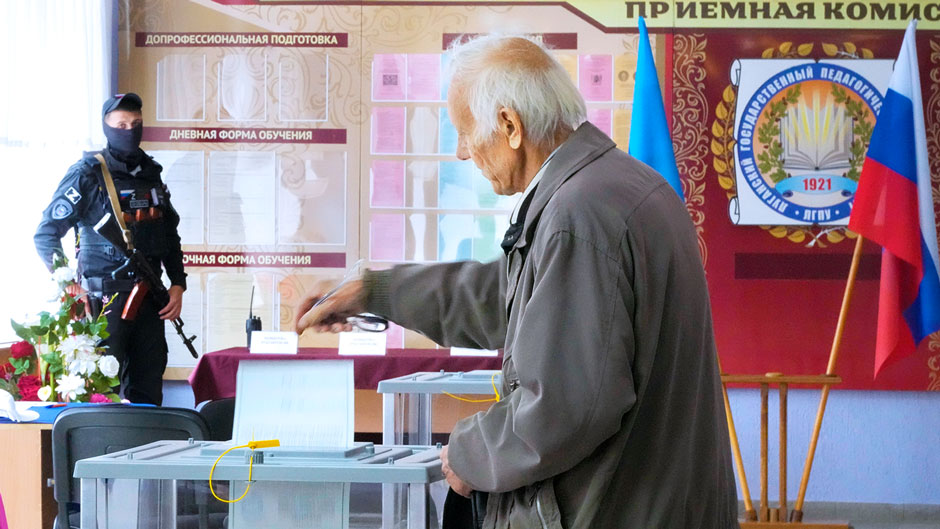In a grandiose ceremony held last Friday at the Kremlin, Russian President Vladimir Putin announced the annexation of four regions of eastern Ukraine—Donetsk, Luhansk, Zaporizhzhia, and Kherson—into the Russian Federation. The regions would become part of Russia “forever” and be defended with “all military means,” Putin said.
The United States, European Union, U.N. secretary-general, and other world leaders condemned the seizure and the “sham referendums” held in recent weeks to legitimize the land grab. New stronger sanctions were immediately imposed.
University of Miami experts Marcia Beck, a Russian scholar and lecturer in the College of Arts and Sciences, and Caroline Bradley, an international law expert in the School of Law, examined the implications and strategic import of Russia’s latest exploit in the invasion of Ukraine, launched last February.
Why now?
Beck: Putin’s back is against the wall. He’s no fool—he knows he’s losing on several fronts in the war and will do anything to “save face” and show the Russians that they’re getting something for this debacle. He won’t back down. He’ll do anything to get a win, even if it’s a fake win by which he has to force people to play the game and tell them how to play it by putting a gun in their face.
What could Putin hope to gain?
Beck: In addition to saving face, he can claim that any military assault in those regions is an attack on Russia proper. That way he can rattle his nuclear saber and threaten war with the West. The nuclear threat is another attempt to scare the West into stopping sanctions and to cause a rift among Western nations. But he’s too late on both counts. Nuclear weapons are not a viable battlefield strategy in this war and offer no strategic advantage for a number of reasons.
What international law or safeguards govern against this kind of action and how might they be invoked?
Bradley: Under the U.N. Charter, states have the obligation to resolve disputes peacefully. Where there are threats to peace, the U.N. Security Council has the responsibility within the U.N. system to address those threats. Unfortunately, the Security Council is unable to act in situations where a permanent member, such as Russia, is involved, because the permanent members can veto action by the Security Council. This is not the first time that a permanent member of the Security Council has blocked U.N. peacekeeping actions, but it does illustrate weaknesses in the international institutional arrangements to ensure peace and prevent war.
There is a fundamental issue here that the Russian actions in Ukraine are in violation of Ukraine’s territorial sovereignty. Article 1 of the U.N. Charter guarantees the right of self-determination of peoples. Secession of territory from one state can be an example of self-determination. For example, South Sudan seceded from Sudan and became a member of the United Nations.
In recent weeks, Russia conducted referendums in the region, widely condemned as “sham referendums.” How do these impact the scenario?
Bradley: The situation in the Ukrainian territories is complicated because, to the extent there is any suggestion of popular support for the secession, it is based on votes carried out under compulsion and threats. Thus, a continuation of the aggression, rather than a genuine example of self-determination.
In international law, the principle of recognition is important with respect to the existence of states and at times to which groups within the state is the legitimate actor (e.g. Venezuela). The Russian annexation of the Ukrainian territories is not being recognized as valid.
Why these four territories? What strategic importance?
Beck: The Russians already have a stronghold in Donetsk and Lubansk; and so, they would be the easiest to control. The population there contains more Russian speakers and more Russian supporters, so they would be the lowest-hanging fruit for the Russians.
Zaporizhzia, in southeast Ukraine, is important to the Russians because of its nuclear power plant—the plant supplies one-fifth of all Ukrainian electricity and half of that produced by Ukraine’s four nuclear power plants. The region is only a few hundred miles from Crimea, critical for Russian control of that occupied sector of Ukraine.
Kherson would be the real jackpot for Russia, as it offers key access to Ukraine’s Black Sea ports and has rich agricultural lands—from sunflowers to soya beans. Controlling this region would further cripple the Ukrainian economy. It is also a key access point to Crimea, which Russia wants to control. Russian control would thus be strategically and economically disastrous for Ukraine, and the reason the Ukrainians are fighting so hard there.
Russian authorities have insisted that the newly incorporated lands would be entitled to full protections under Russian military doctrine. What significance would this have?
Beck: It means that because the latest Russian military doctrine says that if ‘‘Russia faces an existential threat from conventional weapons,’’ Russia will deem it legitimate to reply with nuclear weaponry. So, in addition to all the other military protections any other part of Russia would have, if Putin decides that the use of conventional weapons constitutes ‘‘an existential threat’’ to Russia—which would in his mind now include the annexed territories—he could resort to nuclear force.
Addendum:
The day after the Kremlin ceremony, Ukrainian forces overtook the town of Lyman, a key supply hub in one of the newly annexed regions, forcing thousands of Russian troops to retreat. The recapture is the most significant Ukrainian victory in the region since the onset of the Russian invasion.

